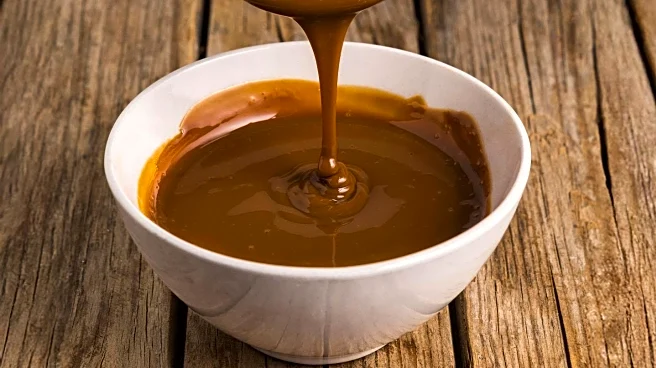What is the story about?
What's Happening?
Brown sauce, traditionally associated with bacon sandwiches, is being explored for its versatility in culinary applications. Tom Harris, co-owner and chef at the Marksman in London, highlights its use in cleaning penny coins, while Sabrina Ghayour, author of Persiana Easy, praises its complex ingredients like tamarind. The sauce's recipe was controversially altered in 2011, reducing its salt content, which affected its balance. Despite this, chefs like Anna Tobias of Cafe Deco are finding new ways to incorporate brown sauce into dishes such as hashes and roast pork, suggesting it as an alternative to apple sauce. The sauce's tangy and savory nature makes it suitable for enhancing soups, stews, and marinades, according to Ghayour.
Why It's Important?
The exploration of brown sauce's versatility reflects broader trends in culinary innovation, where traditional condiments are being reimagined to enhance diverse dishes. This shift could influence consumer preferences and market demand for condiments, encouraging manufacturers to consider recipe adjustments or new product lines. Chefs and home cooks stand to benefit from the expanded use of brown sauce, potentially reducing food waste by utilizing excess sauce creatively. The discussion around recipe changes also highlights consumer sensitivity to ingredient modifications, which can impact brand loyalty and sales.
What's Next?
As chefs continue to experiment with brown sauce, there may be increased interest in developing new recipes or products that capitalize on its versatility. Restaurants might incorporate brown sauce into more menu items, promoting it as a unique flavor enhancer. Consumer feedback on recipe changes could prompt manufacturers to revisit ingredient formulations, balancing traditional flavors with modern dietary preferences. Additionally, culinary publications and cooking shows may feature brown sauce in innovative recipes, further popularizing its use beyond traditional pairings.
Beyond the Headlines
The exploration of brown sauce's uses touches on cultural dimensions, as it challenges traditional culinary norms and encourages experimentation. This trend reflects a broader movement towards fusion cuisine, where diverse flavors and ingredients are combined to create novel dishes. The discussion around recipe changes also raises ethical considerations regarding transparency in food manufacturing and the impact of ingredient modifications on consumer trust. Long-term, this could influence how food brands communicate changes to their products and engage with their customer base.

















